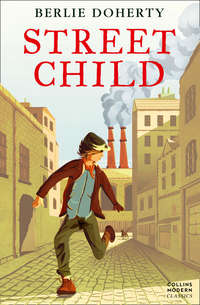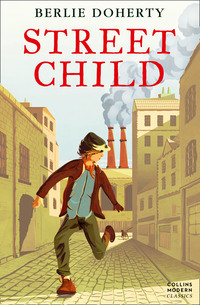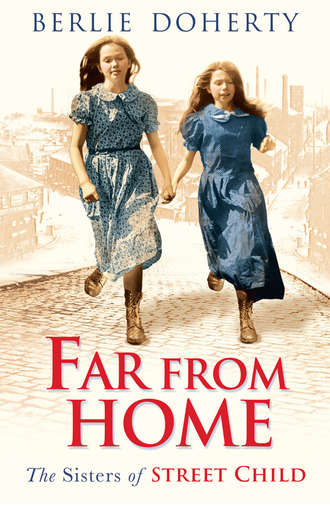
Полная версия
Far From Home: The sisters of Street Child
Emily risked a quick look over her shoulder. “They’re looking at us,” she whispered.
“Oh my, I could faint. I could pass out stone cold. They’ve seen me now, so I must go on as if I’ve been on an errand for Judd. That’s it. What you must do, you must carry on walking as if you don’t know me, and when the mistresses have gone in and the door’s shut behind them, run round quick and come in our door. Now scarper.”
Emily and Lizzie walked sharply away from her without looking back until they reached the corner. They paused as if they were waiting for someone, and Emily turned her head quickly towards the house. She saw Rosie walk steadily towards the women, bobbing to them as she passed, and then going down the steps to the servants’ quarters.
“Why was she so frightened?” Lizzie asked.
“I think she’s scared she might lose her job.”
“Because of us?”
Emily said nothing, just watched the trundling carts, the bustle of passers-by. The main house door closed, the driver climbed back into his seat and urged his pair of horses to walk on, and still they waited.
“I haven’t eaten anything yet,” Lizzie said.
Emily nodded. “All right. We’ll go in. It should be quite safe now.” She began to walk towards the house. “Poor Rosie. Poor Rosie. What have we done to her? If only you hadn’t run off like that, Lizzie! What were you thinking of?”
“It was because of yesterday. When Ma left us behind …”
“She had to. You know that. She had no choice.”
“Rosie said she’d speak up for you.”
“I know.”
“But she said she’d take me to her sister’s in Sunbury.”
“I know.”
They had reached the railings of the house. Six steps down, and they would reach the servants’ basement. Through the door, and they’d be in the kitchen, and Rosie would be there, and there’d be work to do. There would be no chance of a private talk.
Lizzie grabbed Emily’s arm. “You won’t let her, will you?” she blurted out. “You won’t let her take me away from you?”
“Of course I won’t.”
“Even if she gets you a job here, and you love it, and it’s Ma’s kitchen and everything? Even if Judd says you’re the very girl she wants?”
“Never,” said Emily firmly. She took both Lizzie’s hands in her own. “We’re sisters, aren’t we? Where you go, I go. I promise.”

The kitchen was grim with worry. The fire sulked in the grate, there was no sunlight coming through the window; even the pans had lost their sparkle. Rosie was on her hands and knees picking up the last of the shards of broken china. She hoisted herself up and handed Lizzie a small brush.
“Here, you can finish the job. And then you can soap the stairs down.”
“I haven’t eaten anything yet,” Lizzie reminded her timidly.
“Neither have I, neither has your sister. Get that job done first. Em’ly, you can be slicing up some bread and ham for us all. Forget breakfast, as we’re long past it now. I couldn’t stomach it anyway. Then we’ve got to get on with cooking that meal for supper. And there’s four more to cook for now: the Crabapple and the Crocodile and their two hoity-toities. Good job we bought plenty of meat this morning, Em’ly. And, Lizzie, when you’ve done the stairs you can take your bread and ham into the pantry. I’m sorry, but you’ll have to eat your meal in the dark. I daresay your hand can find its way to your mouth? If the mistresses come down, as well they might, I’ve got a story for them in my head. But it doesn’t include you just at the moment.”
An hour later the kitchen was oozing with the smell of juicy meat simmering in a pot over the fire. Emily was rolling pastry, in her quick, light way. She was using the wooden rolling pin that her ma would have worked with. Rosie was chopping carrots and onions. Neither of them spoke a word. Their ears were straining for the sound of Judd’s tread on the servants’ stairs; and at last it came. The door was flung open, and in she swept, with her black skirts brushing the floury tiles like a duster.
“Rosie, you are to go upstairs – now. Master and Mistress Whittle want to speak to you.”
“Yes, Judd.” Rosie put down her chopping knife and smoothed her hands clean on the apron. “Have I to take Em’ly with me?” Her breath came out like a trembling shudder.
“Certainly not. They want you on your own. They want you to explain why you have brought street children into the house.”
“Not street children, Judd. Didn’t you tell them they’re Annie’s daughters?”
“They didn’t ask me. It’s you they want to speak to.” Judd swept out of the kitchen, and the flour settled back into the cracks between the stones. Rosie said nothing. She tucked her hair under her cap, removed her working apron and slipped on a newly starched clean one and, without saying a word to Emily, followed Judd up to the main part of the house.
Emily didn’t dare to open the door to the larder to see how Lizzie was. She finished rolling the pastry, trying to keep her hands steady, trying to keep the scorch of tears from blurring her eyes. She lined a pie dish with half of the pastry and put it on the windowsill to keep cool, stirred the meat with a wooden spoon, then carried on from where Rosie had left off, chopping vegetables and herbs. Now tears coursed freely down her face, no matter how often she wiped them away.
Rosie came down at last. Her eyes were red. She put her work apron on without saying anything at all. In silence she transferred the cooked meat from the pot to the pie dish, where it bubbled in its hot gravy. She added the vegetables and herbs and nodded to Emily to roll out the rest of the pastry. She fitted it snugly over the meat, then placed it in the side oven. She raked up the fire. When she spoke at last her voice was flat and dull, and it was only to say that the mistresses would like apple dumplings for dessert, and would Emily be kind enough to show her how to make them as good as her ma did.
All this time, Lizzie was shivering in the dark and cold of the larder, but she wasn’t let out until Rosie had made several journeys upstairs with the cooked food and was quite sure that the master and his business acquaintance, and his wife and her sister, the hoity-toities in their attic room and the Dearies in their creaky bed were all tucking into the best meal they’d had for months. A cauldron of water was set above the fire to wash the dishes, and Judd and the Lazy Cat, Rosie, Lizzie and Emily sat down at the kitchen table to eat what was left. Neither Judd nor Rosie said a word.
“Oh la!” the Lazy Cat said. “Trouble!” And was shushed to silence by her aunt’s fierce look. Rosie hardly ate a thing, but kept sighing and sniffing and blowing her nose. Emily glanced at Lizzie and shrugged slightly to show her that she hadn’t a clue what was going on. She knew Rosie was in trouble, and they thought Judd was probably in trouble too. They also knew that it was all because of them.
Later, when Rosie brought all the dishes down from the various rooms of the main house, she said, simply and flatly, “They ate the lot.”
Judd and her niece went upstairs to see to the fires and warm the beds. Rosie looked at the two girls where they sat on the kitchen bench, then briefly put her arms round each of them in turn.
“What’s going to happen, Rosie?” Emily asked.
“I want you to get some sleep now. That’s what’s going to happen next.” She gave a long, deep sigh that was full of inner worry. “Like your ma asked, I’m trying to do my best for you. I’m going up to my room. Good night, girls.”
Emily and Lizzie lay wrapped in their rugs in front of the fire, watching the flicker of flames as they licked through the damped coals.
“Something bad’s going to happen, isn’t it?” Lizzie asked.
“I don’t know. Ssh now, go to sleep, like Rosie told you. Everything will be all right.”
Very soon, in spite of all their worries, the girls fell asleep.
And then, in the middle of the night, Lizzie felt herself being lifted up and carried across the room. She thought at first that it was part of a dream, until the street door was opened and a shock of cold air startled her into wakefulness. She was set down, her cloak put round her shoulders, her boots laced onto her feet and a small bundle thrust into her hands. All this was in the pitch-dark, with no words spoken. Then a hand grasped her own.
“Emily?” But she knew it wasn’t Emily’s hand; it was too large, too cold, too tight.
“Emily!”
She reached back to the door of the house just as it was closed firmly against her. She heard the key turn in the lock.
“Emily! Emily!” she screamed, and then a hand was clamped across her mouth and she was pulled away, up the steps, and out onto the street.
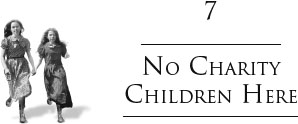
Emily opened her eyes, startled awake. Surely she’d heard Lizzie’s voice? She felt across the hearthrug for her, then scrambled to her feet. Lizzie wasn’t there! She heard her voice again, footsteps outside, someone running, someone dragging her feet as if she was being pulled along. She groped for the door, helplessly pressing the latch, but it had been firmly locked.
“Lizzie! Lizzie!” She banged on the door with her fists. “Wait for me!”
A light flared behind her, and she turned to see a woman holding up a candle, her nightdress white as a spectre’s, her eyes deep and dark in her pale face, her cheeks high and gaunt with deep hollows. Her grey hair hung in long strands round her shoulders.
Emily screamed, and the spectre stepped forward and put a bony hand on her arm. “Hush, girl! Do you want to bring the whole household down here?”
It was Judd’s voice. Emily shuddered with relief.
“Please let me out, Judd. Something’s happened to Lizzie. I think someone’s taken her away.”
“Nothing’s happened to Lizzie,” Judd hissed. “She’s with Rosie Trilling.”
“She can’t be! Not without me!”
“Be quiet! If you must know, Rosie has given up her job. For your sake! You must stop this noise. Upstairs won’t take kindly to being woken up in the night by your ranting.”
“I don’t understand! Rosie wouldn’t leave me here. I’m not staying without Lizzie. Let me out!” But Emily could see that Judd had no keys dangling from the waist of her nightgown. Where had she hidden them? She rattled the latch again, helplessly, uselessly.
“Stop that! I think you know very well what I mean. Rosie has been dismissed, to put it plainly. Gone, gone, and taken the girl with her.”
“But where’ve they gone?”
“She’s taken Lizzie to try to get her a job in Sunbury with her own sister, and let me tell you that’s a long long walk from here, and then it’s back home for Rosie, back to an evil grandfather and a wretched life as a coster-girl.”
Judd turned to go back to bed, lifting her candle to light her way to the other door, and Emily just caught the glint of something bright in her hand. She knew it was the door key. She ran in front of the housekeeper and tried to snap the key out of her hand. Judd shouted in anger and tried to force her away, and in the tussle she dropped the candle. There came the sound of hurried footsteps on the stairs, the glow of another candle, and a tall woman came into the kitchen. Her hair hung in a long plait over her shoulder, and with one hand she clutched to her throat the ends of a black velvet shawl flung over her nightdress. With the other she held the candle high.
“What in the name of the Lord is going on here?”
Her voice made the pans vibrate on the shelves, the glasses tremble in their locked cupboard, the cutlery jitter in the drawers. Emily recognised her as the older of the two women who had stepped out of the carriage that morning: the Crabapple, mistress of the house. Dithering behind her now were two old ladies, cackling and whooping with excitement, and the Lazy Cat. Her eyes were alight with scorn. “Gone!!” she sighed.
The Crabapple turned to her. “Is this anything to do with you?”
“Not me, no, ma’am. I know nothing about it. Something about two girls who were dragged in from the streets. Friends of that Rosie Trilling. I don’t know what they were doing here in your house, ma’am.”
The Crabapple advanced towards Emily, thrusting the candle under her face. “Who are you?”
“She’s Emily Jarvis. She’s the new cook,” Judd said, bending to scoop up her candle.
“The new cook?”
“I can cook,” the Lazy Cat muttered.
Her Aunt Judd shot her a knowing glance and signalled to her to go back to her room. “Rosie Trilling has gone, like you told her to, ma’am.”
“Please don’t blame Rosie,” Emily begged. “She was trying to help me.”
“So we need a new cook,” Judd went on. “And this is her.”
“The new cook?” the Crabapple said again. “This child?”
“Please, miss, I want to go,” said Emily bravely.
“You want to go?”
“She wants to follow her sister,” Judd said with a snort, as if it was the most ridiculous idea in the world.
“Then go!” said the Crabapple. “I don’t want street girls in my house. Go.”
The two Dearies whooped gleefully. The Lazy Cat, lingering in the doorway, smiled to herself.
“Unlock the door, and let her go,” the Crabapple said to Judd. “Out, girl. Out. I’ll have no charity children here.”
Without a word, Judd stalked over to the back door and unlocked it. Emily bundled up the rug she had been sleeping on, snatched her boots, and scampered through the door, across the yard, and up the outside steps to the street.
Below her, the servants’ door was slammed shut and locked.
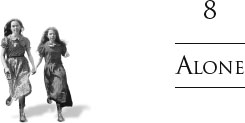
Dawn was beginning to break with a grey, steely light. The street was deserted, except for the lamplighter tramping towards the main road, stretching up his long pole to extinguish the street lamps. Emily ran to him, her bare feet slapping the cold stones.
“Wait, oh wait! Please, mister, have you seen a woman and a girl coming this way?” she panted.
Saying nothing, the lamplighter just pointed to where an early mist was coiling up in smoky wreaths from the direction of the river. Emily ran on to the Thames and along the bank, calling, “Lizzie! Lizzie! Lizzie!” She had to find her. Would they have gone this way, or that? “Lizzie! Rosie!” Her voice echoed off the old boat sheds. People were beginning to move, horses were being fastened to their carts, beggars uncurling from their sleeping-holes. Costermongers trudging out of their cottages, their trays loaded with breakfast shrimps to sell to the early-morning workers; street children crept like rats out of the shadowy arches of bridges to scavenge what they could. But there was no sign of Lizzie and Rosie.
“Which way? Oh, which way?” Emily gazed round in despair.
“’Ere. You’re lost, ain’tcha?”
A boy was sitting in the gutters, with a string of shoelaces in his hand. He was dressed in the tattered clothes of a street child, barefoot and dirty, with tangled hair.
“Don’t know yer way back home? Cos like, I know these streets inside out and upside down, I do, and I can take you anywhere you wants to go, and maybe your ma and pa would give me a penny or a farving for finding you, or maybe not, I don’t care.” He grinned up at her. “Why don’t you sit down for half a minute and catch your breff, and have a little fink?”
She shook her head, though she was exhausted with running so far. She didn’t have time to take a rest. Rosie was a quick walker. They could be anywhere by now. “I’m looking for my sister,” she said. “And my friend Rosie. You haven’t seen them, have you?”
The boy frowned. “Not seen no one this morning of the female kind, ’cept for Raggedy Annie and the like. Seen a lot of dogs. There was an old man as wouldn’t buy me laces, even though his own was frayed like pieces of old straw. Too mean, he was, and when he trips over he’ll remember me and fink, I wish I’d helped that boy out. But I ain’t noticed anyone else this morning. Why don’t yer go back home? Maybe they’ll be there, waiting for you.”
Emily shook her head, too upset to speak now. She turned away from him and began to trudge back the way she had just come. She hadn’t got a home, not any more. Even if she found her way back to the Big House, she couldn’t go inside. She didn’t belong there now. She didn’t belong anywhere. She felt a surge of panic. What if she didn’t find them? What on earth would she do?
“Any idea where they was heading?” the boy called after her.
She stopped. “Yes!” Why hadn’t she thought of that? She tried to force the word out of the back of her memory. Somewhere that made her think of sunshine. “Sunbury! They were going to Sunbury!”
He whistled softly. “That’s out of my patch, that is. Cor, it’s miles and miles away! Tell you what. You’ll have to get onto one of the main roads and ask the coachmen there. Go along there to that big church and then you’ll find some coaches. Maybe they’ve took one, cos they won’t be walking that far I don’t fink.”
“They won’t be on a coach,” Emily said sadly.
The boy whistled again. “No money, eh? There’s only two choices for people wiv no money. The streets, or the workhouse up that lane, and I know which one I choose. I’ve been there, I have, and I got out again as quick as a cat. Never go there again, I won’t.”
Emily started running again. Her head was thudding. She’d wasted too much time; she shouldn’t have stopped. She must have really lost them by now. Ahead of her she saw the church. She could just make out a line of coaches where someone might tell her the way to Sunbury. Sunbury – the long, long walk. Could Lizzie manage it? But what were the other choices? The streets, and a life of begging and stealing and sleeping under bridges. Would Rosie let that happen? The workhouse. No, no, not the workhouse. Surely they wouldn’t go to the workhouse. But Ma might be there. Jim might be there. She stood at the end of the lane that the boy had pointed to. At the far end, she could see a tall building with black gates. No. They wouldn’t go there. Never.
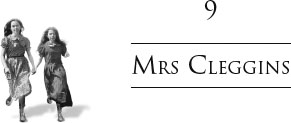
Rosie and Lizzie had stopped running by now. They were well away from the Big House, and Rosie knew that Lizzie would never find her way back there on her own. She drew her under a bridge to rest a little, and let go of her grasp. Gulls screeched mournfully, the tide was out, the riverbanks were a stinking mess of mud and fish bones and rubbish. Further down the river they could see a huddle of fishermen’s cottages, clustered together like a mouthful of rotting teeth.
“That’s where I come from,” said Rosie. “That’s where I was born. Went up in the world, I did, thanks to your ma.” And now it looks as if I’m sunk back down, just like that, she thought to herself.
Lizzie thought the cottages looked even worse than Mr Spink’s tenement house where she used to live with Ma and Emily and Jim. How long ago was that? Only three days? And where was Ma now? Where was Jim?
“Is that where you’re taking me?”
“Oh no. My granddad would eat you up. Like a snappy dog, he is. He’s wicked. I wouldn’t take you there. No, Lizzie, we’re going to Sunbury.”
“I want to go back to Emily. Back to the Big House.”
“Well, you can’t,” Rosie said firmly. “We’ve been kicked out. There, now you know, and I wasn’t going to tell you that. We’ve got to go to Sunbury, or starve, and that’s the truth. It’s our only hope now. My sister might speak for us. We’ll be all right there, maybe. But we’re going to be walking till our legs drop off, so best get a move on. Up that lane now.”
It was beginning to drizzle with a sharp, frosty sleet. Rosie stopped to pull her shawl up over her head. I wish I was back in that big warm kitchen, she thought. The job of my dreams, that was, working there. Never again, Rosie. Not for you.
“What’s that big building up there, with the black railings?” Lizzie asked. She had a feeling that she knew very well what it was, that it had been pointed out to her in the past as a house to be afraid of, a last-place-in-the-world sort of house, more frightening even than a graveyard.
“It’s the workhouse,” Rosie said. She tugged Lizzie’s arm, anxious to hurry past the place, but Lizzie pulled herself away from her.
“I want to go there. If I can’t go back to the Big House, I want to go there.”
“Not there! I won’t let you.”
“But Ma might be there. And Jim. I want to be with them.” Lizzie was already running up the middle of the slippery road, and all Rosie could do was to lift her skirts out of the muck and run after her. Maybe, she thought fleetingly, it would be for the best. In her heart of hearts she knew that her sister would never be able to find work for both of them, probably not even for one of them. At least if Lizzie was in the workhouse she would have food of sorts, and a roof over her head. She wouldn’t be sleeping on the streets like the other homeless children. But the nearer she drew to the huge iron gates that kept the inmates of the workhouse away from the rest of the world, the more her dread and fear of the place grew.
Never, she thought. I’ll never let Annie’s child go there.
Lizzie had nearly reached the railings when she saw a group of children being herded out of the door into the workhouse yard. A boy ran ahead of the others and stood clutching the railings with both hands, his white face peering out through the bars.
“Jim! It’s Jim!” Lizzie yelled, slipping down on the greasy cobbles in her eagerness to get to him. But when the boy turned his head to look at her she could see that it wasn’t her brother at all. He stuck his hand through the bars.
“Got any bread, miss? Got some cheese?”
“Do you know Jim Jarvis?” Lizzie asked him. “Did a boy come here with his mother, and she was sick and weak and he probably had to help her to walk – did you see them?”
The boy looked puzzled. “A boy and his ma?”
“Did you see them? She’s Mrs Jarvis. Annie.” Lizzie looked over her shoulder anxiously. Rosie had nearly reached her. “He’s called Jim. He’s my brother.”
“Jim Jarvis?” the boy repeated. “Jim Jarvis and his ma?” As if it was part of a nursery rhyme that he was trying to remember.
As soon as Rosie reached them she fumbled in her bag and brought out a hunk of cold pastry that she had saved from last night’s supper. It was meant to keep them going on their long walk to Sunbury. She held it out towards the boy and as she did so, she shook her head very slightly, and narrowed her eyes, and made her mouth into the silent shape of “no”.
“No,” said the boy quickly. “No Jim Jarvis here.” He snatched the crust and ran to join the other children who were being hustled towards the gates by the ancient workhouse porter.
“Stand ’ere and wait till the coach comes,” the old man was saying to them. “And thank the Lord you’re going to a better life. Is that Tip?” he shouted to the boy. “What you eating? Been beggin’, ’ave yer?” He grabbed the boy and dragged him away. “You ’eard what Mr Sissons said! Wait nice and quiet till Mrs Cleggins comes. No begging, no annoying, be’ave like a gentleman! Lost yer chance now, you fool.” And he dragged Tip back inside the workhouse building. The other children clustered together, giggling nervously. A tall, handsome boy grinned and raised his hand as if he was saluting as a smart carriage drew up to the gates. The waiting children cheered and surged forward.
“There you are,” said Rosie. “They’re not there, and nor will you be. It’s no place to live or die, I can tell you that.”


